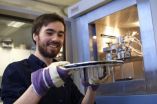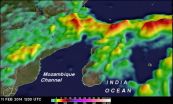(Press-News.org) Today, deep waters formed in the northern North Atlantic fill approximately half of the deep ocean globally. In the process, this impacts on the circum-Atlantic climate, regional sea level, and soak up much of the excess atmospheric carbon dioxide from industrialisation — helping to moderate the effects of global warming. Changes in this circulation mode are considered a potential tipping point in future climate change that could have widespread and long-lasting impacts including on regional sea level, the intensity and pacing of Sahel droughts, and the pattern and rate of ocean acidification and CO2 sequestration.
Until now, this pattern of circulation has been considered relatively stable during warm climate states such as those projected for the end of the century. A new study led by researchers from the Bjerknes Centre of Climate Research at the University of Bergen (UiB) and Uni Research in Norway, suggests that Atlantic deep water formation may be much more fragile than previously realised.
The researchers Eirik Vinje Galaasen (UiB), Ulysses Ninnemann (UiB), Nil Irvali (Uni Research), and Helga (Kikki) Kleiven (UiB) and their colleagues from Rutgers University, USA (Professor Yair Rosenthal), Laboratoire des Sciences du Climat et de l'Environnement, France (Research Scientist Catherine Kissel) and the University of Cambridge, UK (Professor David Hodell) used the shells of tiny single-celled, bottom-dwelling foraminifera found in marine sediment in the North Atlantic Ocean to reconstruct the surface ocean conditions and concomitant deep ocean circulation of about 125,000 years ago. This is the last interglacial period, when the North Atlantic was warmer, fresher and sea level was higher than it is today and looked a lot like what climate models predict it will look by the end of this century.
"At that time, there were a series of sudden and large reductions in the influence of these North Atlantic waters in the deep ocean. These deep water reductions occurred repeatedly, each lasting for some centuries before bouncing back. The unstable circulation operated as if it was near a threshold and flickered back and forth across it," says Eirik Vinje Galaasen, a PhD student and now researcher at UiB's Department of Earth Science, who is the lead author of the paper published in the journal Science.
"These types of changes hadn't been noticed before because they are so short-lived. Geologists hadn't focused on century scale ocean changes because they are difficult to detect," adds Professor Ulysses Ninnemann, from UiB's Department of Earth Science and Galaasen's PhD adviser.
"Our study demonstrates that deep water formation can be disrupted by the freshening of the regional surface water, which might happen due to enhanced precipitation and glacier melting under future climate change scenarios," says Yair Rosenthal, a co-author on the paper.
The international team studied traces of deep ocean properties imprinted in the sediments on the seafloor. Coring into the seafloor mud they could look back in time to reconstruct changes in the abyssal ocean at a location South of Greenland that is sensitive to North Atlantic Deep Water. The mud at this location builds up 10 times as fast as normal, recording much shorter changes than at other sites. Although the changes are short from a geological perspective, a few centuries of reduced deep water could be a big deal for societies that would have to grapple with things like draughts and sea level changes that could accompany them.
No "The Day After Tomorrow" scenario: A popularised notion is that if the ocean circulation declines it could cause large cooling or, as in the case of the Hollywood movie The Day After Tomorrow, a new ice age. Although some cooling did occur locally south of Greenland when the circulation slowed, there was no evidence for really large cooling associated with these changes. It could be that human beings haven't been able to find it yet, but equally reasonable is that humankind simply don't get really big cooling as the ocean slows down because when it is really warm, sea ice cannot form, and this supercharges the cooling effect of ocean circulation changes. In any event, the super cooling or slide into the next ice age as popularised in a Hollywood blockbuster did not occur.
Will this happen to the future Earth? Many models have actually predicted a slow and gradual decline in North Atlantic circulation over the next century. However, different models offer widely different scenarios for what will happen in the future. While the climate of the last interglacial is not exactly what will be the case in a future greenhouse world, it does share some features, including being fresher and warmer by a few degrees Celsius in the northern Atlantic. Training models, if models can capture the types of changes we see in the past, may also be doing a good job at predicting the future. The seafloor evidence suggests that there were large and fast changes in circulation the last time the ocean looked the way it may look by the end of this century.
INFORMATION:
The Bjerknes Centre for Climate Research
The Bjerknes Centre for Climate Research (BCCR) is a cooperation on climate research among the four partners University of Bergen, Uni Research, the Institute of Marine Research and Nansen Environmental and Remote Sensing Centre, located in Bergen, Norway.
Key research themes are the climate system and climate changes in the past, present and future, caused by both natural and man-made changes.
The scientific staff consists of more than 150 researchers and scholars, who come from Norway and several other European countries, USA, Canada, China and several countries in Africa, Asia and South America.
The Bjerknes Centre is named after Vilhelm Bjerknes and his son Jacob Bjerknes, who were the leading figures of the Bergen School of the physics of atmosphere and ocean.
Read more at http://www.bjerknes.uib.no
Unstable Atlantic deep ocean circulation under future climate conditions
A new study looking at past climate change, asks if these changes in the future will be spasmodic and abrupt rather than a more gradual increase in the temperature
2014-02-20
ELSE PRESS RELEASES FROM THIS DATE:
Sequencing hundreds of nuclear genes in the sunflower family now possible
2014-02-20
Advances in DNA sequencing technologies have enormous potential for the plant sciences. With genome-scale data sets obtained from these new technologies, researchers are able to greatly improve our understanding of evolutionary relationships, which are key to applications including plant breeding and physiology.
Studies of evolutionary (or phylogenetic) relationships among different plant species have traditionally relied on analyses of a limited number of genes, mostly from the chloroplast genome. Such studies often fail to fully or accurately resolve phylogenetic ...
Study shows that premature infants benefit from adult talk
2014-02-20
Research led by a team at Women & Infants Hospital of Rhode Island and The Warren Alpert Medical School of Brown University has been published in the February 10, 2014 online edition of Pediatrics, the official journal of the American Academy of Pediatrics. The research indicates that premature babies benefit from being exposed to adult talk as early as possible.
The research, entitled "Adult Talk in the NICU (neonatal intensive care unit) with Preterm Infants and Developmental Outcomes," was led by Betty Vohr, MD, director of Women & Infants' Neonatal Follow-Up Program ...
GW researcher finds gene therapy a promising tool for cardiac regeneration
2014-02-20
WASHINGTON (Feb. 20, 2014) — After a heart attack, there is often permanent damage to a portion of the heart. This happens, in part, because cardiac muscle cells are terminally differentiated and cannot proliferate after blood flow is blocked off to the heart. This partial healing can be attributed to heart disease being one of the leading causes of death. What if the cells could be stimulated to divide and the heart could be induced to repair itself? This was the question posed by George Washington University (GW) researcher Scott Shapiro, M.D., Ph.D., and his co-authors, ...
Active thyroid may raise risk of depression in older individuals
2014-02-20
Chevy Chase, MD—When older individuals' thyroid glands are more active than average, it may be a risk factor for depression, according to new research accepted for publication in the Endocrine Society's Journal of Clinical Endocrinology & Metabolism (JCEM).
Beyond its role in regulating the body's metabolism, the thyroid gland also can influence mental health. Past research has found links between an increased risk of depression and both over- and underactive thyroid glands. This study is the first to find an association between depression and thyroid activity variations ...
Stress hormone linked to frailty
2014-02-20
Chevy Chase, MD—Lower morning and higher evening cortisol levels contribute to frailty in older individuals, according to new research accepted for publication in the Endocrine Society's Journal of Clinical Endocrinology & Metabolism (JCEM).
Frailty confers a high risk for institutionalization and increased risk of mortality and is characterized by unintentional weight loss, feelings of exhaustion and fatigue, physical inactivity, slow gait speed and low grip strength. Neuroendocrine function, including cortisol secretion, is thought to be involved in the etiology of ...
Study in fruitflies strengthens connection among protein misfolding, sleep loss, and age
2014-02-20
PHILADELPHIA - Pulling an "all-nighter" before a big test is practically a rite of passage in college. Usually, it's no problem: You stay up all night, take the test, and then crash, rapidly catching up on lost sleep. But as we age, sleep patterns change, and our ability to recoup lost sleep diminishes.
Researchers at the Perelman School of Medicine, University of Pennsylvania, have been studying the molecular mechanisms underpinning sleep. Now they report that the pathways of aging and sleep intersect at the circuitry of a cellular stress response pathway, and that ...
Enhancement of chemotherapy by prevention of tumor cell repair
2014-02-20
This news release is available in French. Chemotherapies are cancer treatments that work by inducing lesions in the DNA of tumour cells in order to inhibit their proliferation. However, the body naturally tries to repair these lesions, and thus reduces the efficacy of chemotherapy. Blocking the mechanisms for DNA repair would help to potentiate chemotherapy by reducing the resistance of cells to treatment. A team of researchers directed by Frédéric Coin, Inserm Research Director at the Institute of Genetics and Molecular and Cellular Biology (IGBMC) in Strasbourg (a ...
Zebrafish discovery may shed light on human kidney function
2014-02-20
ROCHESTER, Minn. — Feb. 20, 2014 — Researchers say the discovery of how sodium ions pass through the gill of a zebrafish may be a clue to understanding a key function in the human kidney. The findings from a collaboration between Mayo Clinic and the Tokyo Institute of Technology appear in the online issue of the American Journal of Physiology-Regulatory, Integrative and Comparative Physiology.
The researchers discovered a protein responsible for gas exchanges in the fish gill structure. Specifically they studied and characterized the Na+/H+ (sodium/hydrogen) exchanger ...
Multilevel approach to coping with stigmas identified
2014-02-20
Socially stigmatized groups have poorer health than non-stigmatized groups, but a team of researchers believes that more emphasis on two-way and multidisciplinary interventions will have a greater and more successful impact on relieving many health issues.
"We took an interdisciplinary approach to understanding how to reduce health disparities due to the effects of social stigma, including stigmas based on race, sexual orientation and chronic illness," said Jonathan Cook, assistant professor of psychology, Penn State.
Stigma results when a negative stereotype becomes ...
NASA's TRMM satellite saw extreme rainfall from Tropical Cyclone Guito
2014-02-20
VIDEO:
This animation of rainfall gathered from Feb. 11-19, 2014, by NASA's TRMM satellite revealed that Tropical Cyclone Guito produced as much as 16.9 inches/430 mm of rainfall in the center...
Click here for more information.
Tropical Cyclone Guito has been a powerful rainmaker, and fortunately, data from NASA's TRMM satellite shows that the heaviest rainfall has occurred over the open waters of the Mozambique Channel and not over land.
The Tropical Rainfall Measuring Mission ...
LAST 30 PRESS RELEASES:
Stem cells from human baby teeth show promise for treating cerebral palsy
Chimps’ love for crystals could help us understand our own ancestors’ fascination with these stones
Vaginal estrogen therapy not linked to cancer recurrence in survivors of endometrial cancer
How estrogen helps protect women from high blood pressure
Breaking the efficiency barrier: Researchers propose multi-stage solar system to harness the full spectrum
A new name, a new beginning: Building a green energy future together
From algorithms to atoms: How artificial intelligence is accelerating the discovery of next-generation energy materials
Loneliness linked to fear of embarrassment: teen research
New MOH–NUS Fellowship launched to strengthen everyday ethics in Singapore’s healthcare sector
Sungkyunkwan University researchers develop next-generation transparent electrode without rare metal indium
What's going on inside quantum computers?: New method simplifies process tomography
This ancient plant-eater had a twisted jaw and sideways-facing teeth
Jackdaw chicks listen to adults to learn about predators
Toxic algal bloom has taken a heavy toll on mental health
Beyond silicon: SKKU team presents Indium Selenide roadmap for ultra-low-power AI and quantum computing
Sugar comforts newborn babies during painful procedures
Pollen exposure linked to poorer exam results taken at the end of secondary school
7 hours 18 mins may be optimal sleep length for avoiding type 2 diabetes precursor
Around 6 deaths a year linked to clubbing in the UK
Children’s development set back years by Covid lockdowns, study reveals
Four decades of data give unique insight into the Sun’s inner life
Urban trees can absorb more CO₂ than cars emit during summer
Fund for Science and Technology awards $15 million to Scripps Oceanography
New NIH grant advances Lupus protein research
New farm-scale biochar system could cut agricultural emissions by 75 percent while removing carbon from the atmosphere
From herbal waste to high performance clean water material: Turning traditional medicine residues into powerful biochar
New sulfur-iron biochar shows powerful ability to lock up arsenic and cadmium in contaminated soils
AI-driven chart review accurately identifies potential rare disease trial participants in new study
Paleontologist Stephen Chester and colleagues reveal new clues about early primate evolution
UF research finds a gentler way to treat aggressive gum disease
[Press-News.org] Unstable Atlantic deep ocean circulation under future climate conditionsA new study looking at past climate change, asks if these changes in the future will be spasmodic and abrupt rather than a more gradual increase in the temperature



